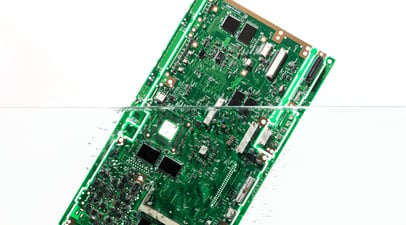Printed Circuit Boards (PCBs) are essential components that ensure electronic devices' smooth functionality and reliability. A critical step in PCB manufacturing is the application of a protective layer known as a solder mask, which insulates, prevents short circuits, and safeguards the copper traces on the PCB. While this issue is purely cosmetic, the main concern of CMs is that improper curing of the solder mask leads to doubt of the overall quality and durability of the product.

A common consequence of uncured solder masks on PCBs is the appearance of ghosting or white haze after cleaning, including areas where no flux is present. Odd right? After extensive testing, ZESTRON found the defect is likely caused due to the following reasons:
-
Improper curing of solder mask
- High-temperature profile for soldering bakes the flux onto the board surface and attacks the solder mask
- High retention time during soldering dissipates the flux under the solder mask
How do you know for sure that improper curing is your problem? A simple test can be conducted to confirm, simply apply heat, via a heat gun, onto the impacted area, and if the white haze disappears, then the uncured solder mask is the culprit.
To resolve the ghosting phenomenon caused by the uncured solder mask, the recommended solution is to bake the board at a temperature of 150°C for 30 minutes. This thermal treatment facilitates the proper curing of the solder mask, eliminating the white haze. However, if the problem persists even after heat treatment, it is advisable to seek professional assistance from experts such as ZESTRON, who can provide targeted troubleshooting for your specific issue.
Proper curing of the solder mask is paramount to ensure the integrity and longevity of PCBs. Uncured solder masks can result in electrical shorts, overheating, reduced solderability, and corrosion. Moreover, as we learned today, it can manifest as a ghosting or white haze on the PCB surface. By understanding the consequences and employing appropriate measures, such as thermal treatment, manufacturers can address the issue of uncured solder masks and ensure the optimal performance of electronic devices.
_1.png)


